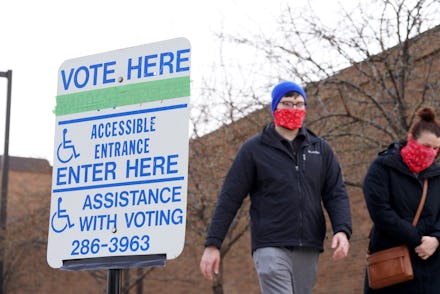The fallout of Wisconsin's mess of a primary is just beginning

Next week, when officials begin counting the results from Tuesday's primary election in Wisconsin, thousands of absentee ballots may go uncounted because of issues related to official postmarks. In other cases, the ballots won't be counted because they never made it to their destination in the first place. At a time when the country is debating the merits and efficacy of a national vote-by-mail program for the general election, Wisconsin's initial results are showing what could go wrong — and what the stakes are.
In the Badger State, local reports have indicated that some absentee ballots never made it to voters. Instead, these ballots apparently sat in tubs at their original processing center, going undelivered, unopened, and unused. It's not clear what happened or why they were never delivered.
After last-minute machinations from state Republicans, Wisconsin went ahead with an in-person election Tuesday, despite ongoing calls for people to stay home to mitigate the spread of coronavirus. Democratic Gov. Tony Evers had attempted to delay the election until June and simultaneously expand vote-by-mail access in the state, but his efforts were overturned by the state's right-leaning Supreme Court as well as the U.S. Supreme Court, which also skews conservative.
As a result, the state's results are likely to be devoid of the input of thousands. People had to choose to risk their lives to vote in person, or else stay safe but possible not be able to exercise their civic duty. And the fact that people were sometimes unable to access their mail-in ballots throws the stakes into stark relief.
Where some ballots were never sent to their prospective voters at all, others that are awaiting counting by state election officials are missing an official postmark — the timestamp across the top of an envelope recording when a ballot was received and processed, which indicates to election officials that the ballot can be counted in the primary. A valid ballot needed to be postmarked by the eve of Wisconsin's election day, April 7, and received by officials no later than April 13. But some ballots are reportedly arriving unmarked.
In recognition of the difficulties involved with counting this primary's ballots, Meagan Wolfe, an administrator with the Wisconsin Election Commission, has instructed clerks to count ballots that can be determined by a "preponderance of the evidence" to have been mailed by election day, even if the envelope does not bear a postmark. The letter offering guidance does name exclusions, however, saying that "it is not sufficient that a voter deposited their ballot return envelope in a mailbox by April 7, 2020." Instead, the ballot needs to have been in possession of the USPS facility or office by that date.
About 1.3 million absentee ballots were requested by Wisconsin voters ahead of Tuesday's primary, but over 200,000 have yet to be returned, and it's unknown if they'll be counted once they arrive. In one Wisconsin town, Fox Point Village, city officials say that leading up to the primary, up to 150 unopened and undelivered ballots were returned per day to city hall. Officials say that they don't know why the ballots were never delivered, according to the Milwaukee Journal Sentinel.
Voters who did not receive an absentee ballot in time for Tuesday's election were encouraged to vote in-person at their nearest polling precinct — requiring them to ignore social-distancing guidelines put forth by the Centers for Disease Control. Additionally, the number of open polling places was drastically lower than in previous years.
In Madison, the state capital, the city clerk said that more than 8,000 absentee ballots were received from voters, but 682 will not be counted because they are missing a postmark. Officials have not yet said if voters will be notified if their absentee ballot was rejected. Voters don't have control over whether their ballot was postmarked, as that's the responsibility of the U.S. Postal Service.
In some cases, ballots are arriving with postmarks that are illegible. Those ballots are going uncounted as well. About 34 ballots in the Wisconsin town of Elm Grove were rejected because the date marked on the envelope was illegible; other ballots have handwritten postmarks, and it's unclear as to whether or not those votes will be counted.
An election official in Superior, Wisconsin, called this year's primary the "worst election I've ever been through." There, 4,300 absentee ballots were requested by voters, and as of Wednesday, according to Wisconsin Public Radio, only about 3,600 had been received by the clerk.
Democratic state Rep. Gordon Hintz has asked the Wisconsin Elections Commission and the state's department of justice for a formal investigation. While the potential results from any investigation likely won't have an impact on Wisconsin's presidential primary results, Molly Collins, the advocacy director of the Wisconsin arm of the American Civil Liberties Union, tells Mic that what's going on now will help the state prepare for a special congressional election in May, and another primary in August, not to mention the general election in November.
Even after 16 primary elections were postponed due to the coronavirus outbreak, giving election officials in those states more time to plan for increased demand for absentee ballots and other social distancing-related adjustments, Wisconsin decided to move forward with its election.
The result is a process that has been marred by lack of access and the fact that it forced people in some cases to choose between their health and their vote. In any election, down-ballot races and initiatives can have margins of victory that as thin as one vote. Voting rights advocates warn that any decrease in voting access harms democracy as a whole.
"Voters deserve free and fair elections where every voice is heard," Shauntay Nelson, the Wisconsin State Director for All Voting is Local, said in a press release, "and the assurance that their health and safety will be protected while our democracy remains intact.”